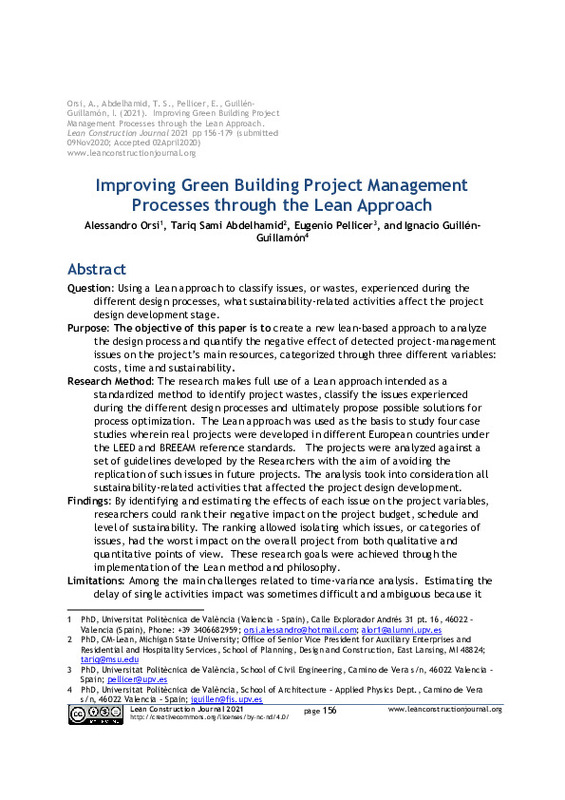JavaScript is disabled for your browser. Some features of this site may not work without it.
Buscar en RiuNet
Listar
Mi cuenta
Estadísticas
Ayuda RiuNet
Admin. UPV
Improving Green Building Project Management Processes through the Lean Approach
Mostrar el registro sencillo del ítem
Ficheros en el ítem
| dc.contributor.author | Orsi, Alessandro
|
es_ES |
| dc.contributor.author | Abdelhamid, Tariq Sami
|
es_ES |
| dc.contributor.author | Pellicer, Eugenio
|
es_ES |
| dc.contributor.author | Guillén Guillamón, Ignacio Enrique
|
es_ES |
| dc.date.accessioned | 2022-12-12T19:01:34Z | |
| dc.date.available | 2022-12-12T19:01:34Z | |
| dc.date.issued | 2021 | es_ES |
| dc.identifier.uri | http://hdl.handle.net/10251/190602 | |
| dc.description.abstract | [EN] Question: Using a Lean approach to classify issues, or wastes, experienced during the different design processes, what sustainability-related activities affect the project design development stage. Purpose: The objective of this paper is to create a new lean-based approach to analyze the design process and quantify the negative effect of detected project-management issues on the project's main resources, categorized through three different variables: costs, time and sustainability. Research Method: The research makes full use of a Lean approach intended as a standardized method to identify project wastes, classify the issues experienced during the different design processes and ultimately propose possible solutions for process optimization. The Lean approach was used as the basis to study four case studies wherein real projects were developed in different European countries under the LEED and BREEAM reference standards. The projects were analyzed against a set of guidelines developed by the Researchers with the aim of avoiding the replication of such issues in future projects. The analysis took into consideration all sustainability-related activities that affected the project design development. Findings: By identifying and estimating the effects of each issue on the project variables, researchers could rank their negative impact on the project budget, schedule and level of sustainability. The ranking allowed isolating which issues, or categories of issues, had the worst impact on the overall project from both qualitative and quantitative points of view. These research goals were achieved through the implementation of the Lean method and philosophy. Limitations: Among the main challenges related to time-variance analysis. Estimating the delay of single activities impact was sometimes difficult and ambiguous because it relied on other activities for which dependency could not be calculated. Limitations related to cost-variance analysis involved indirect costs that were difficult to estimate because they were neither related to any written document nor any formal activity or event of the project. The present research takes into consideration only four case-study projects and therefore the related conclusions cannot be generalized for all building projects. Implications: Applying the ranking of the issues identifies to a real project development with limited resources, it would be possible to highlight which problems should be addressed first in order to avoid, or at least limit, their negative impact on the project establishing a set of guidelines for future projects. Value for authors: This study sets the basis for several other research studies in relationship with green-building developments and lean approach. | es_ES |
| dc.language | Inglés | es_ES |
| dc.publisher | Lean Construction Institute | es_ES |
| dc.relation.ispartof | Lean Construction Journal | es_ES |
| dc.rights | Reconocimiento - No comercial - Sin obra derivada (by-nc-nd) | es_ES |
| dc.subject | Lean construction | es_ES |
| dc.subject | Lean thinking | es_ES |
| dc.subject | Design | es_ES |
| dc.subject | Green-Building | es_ES |
| dc.subject | Development | es_ES |
| dc.subject | Sustainability | es_ES |
| dc.subject | Project management | es_ES |
| dc.subject | Waste | es_ES |
| dc.subject.classification | PROYECTOS DE INGENIERIA | es_ES |
| dc.subject.classification | FISICA APLICADA | es_ES |
| dc.title | Improving Green Building Project Management Processes through the Lean Approach | es_ES |
| dc.type | Artículo | es_ES |
| dc.rights.accessRights | Abierto | es_ES |
| dc.contributor.affiliation | Universitat Politècnica de València. Escuela Técnica Superior de Ingenieros de Caminos, Canales y Puertos - Escola Tècnica Superior d'Enginyers de Camins, Canals i Ports | es_ES |
| dc.contributor.affiliation | Universitat Politècnica de València. Escuela Técnica Superior de Arquitectura - Escola Tècnica Superior d'Arquitectura | es_ES |
| dc.description.bibliographicCitation | Orsi, A.; Abdelhamid, TS.; Pellicer, E.; Guillén Guillamón, IE. (2021). Improving Green Building Project Management Processes through the Lean Approach. Lean Construction Journal. 2021:156-179. http://hdl.handle.net/10251/190602 | es_ES |
| dc.description.accrualMethod | S | es_ES |
| dc.relation.publisherversion | https://www.proquest.com/docview/2617205990/fulltext/F649C280E2BF4570PQ/1?accountid=28445 | es_ES |
| dc.description.upvformatpinicio | 156 | es_ES |
| dc.description.upvformatpfin | 179 | es_ES |
| dc.type.version | info:eu-repo/semantics/publishedVersion | es_ES |
| dc.description.volume | 2021 | es_ES |
| dc.identifier.eissn | 1555-1369 | es_ES |
| dc.relation.pasarela | S\442041 | es_ES |
| dc.subject.ods | 09.- Desarrollar infraestructuras resilientes, promover la industrialización inclusiva y sostenible, y fomentar la innovación | es_ES |






